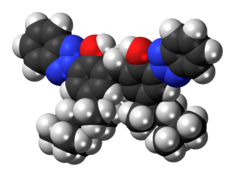Bisoctrizole
This article has multiple issues. Please help improve it or discuss these issues on the talk page. (Learn how and when to remove these messages)
|

| |

| |
| Names | |
|---|---|
| Preferred IUPAC name
2,2′-Methylenebis[6-(2H-1,2,3-benzotriazol-2-yl)-4-(2,4,4-trimethylpentan-2-yl)phenol] | |
| Other names
UV-360
| |
| Identifiers | |
3D model (JSmol)
|
|
| ChEMBL | |
| ChemSpider | |
| ECHA InfoCard | 100.100.550 |
PubChem CID
|
|
| UNII | |
CompTox Dashboard (EPA)
|
|
| |
| |
| Properties | |
| C41H50N6O2 | |
| Molar mass | 658.88 g/mol |
| Melting point | 195.7 °C (384.3 °F; 468.8 K) |
Except where otherwise noted, data are given for materials in their standard state (at 25 °C [77 °F], 100 kPa).
| |
Bisoctrizole (INN[1]/USAN,[2] marketed by BASF as Tinosorb M, by DSM Nutritional Products as Parsol Max , by Everlight Chemical as Eversorb M, and by MPI as Milestab 360, INCI methylene bis-benzotriazolyl tetramethylbutylphenol) is a phenolic benzotriazole that is added to sunscreens to absorb UV rays.[3] It is a broad-spectrum ultraviolet radiation absorber, absorbing UVB as well as UVA rays.[3] It also reflects and scatters UV.[citation needed]
Bisoctrizole is what is termed is a hybrid UV absorber, which has been described as an organic UV filter produced in microfine organic particles (< 200 nm),[verification needed][4][better source needed][5][non-primary source needed] like microfine zinc oxide and titanium dioxide.[dubious – discuss][citation needed] Where other organic UV absorbers dissolved in either the oily or aqueous phases, bisoctrizole dissolves poorly in both.[citation needed]
Hence, bisoctrizole is formulated in sunscreen preparations as a 50% suspension, the absorber added to the water phase,[contradictory] and mineral micropigments usually added to the oil phase.[citation needed] The bisoctrizole particles are stabilized by the surfactant decyl glucoside.[citation needed] The compound shows very little photodegradation, and has a stabilizing effect on other UV absorbers, octyl methoxycinnamate (octinoxate) in particular.[citation needed]
In primary research reports, bisoctrizole has been reported to minimally penetrate skin,[6][non-primary source needed] and has been described as lacking estrogenic effects in vitro.[7][non-primary source needed]
Bisoctrizole has not yet been approved by the U.S. Food and Drug Administration (FDA),[citation needed] but is approved in the EU and other parts of the world.[8][better source needed][9][10][full citation needed]
References
- ^ WHO Staff (2005). "Recommended International Nonproprietary Names: List 54, International Nonproprietary Names for Pharmaceutical Substances (INN) [Entry 'bisoctrizolum']". WHO Drug Information. 19 (3). Archived from the original on October 19, 2009. Retrieved July 5, 2022.
- ^ National Library of Medicine Staff (July 5, 2022). "Bisoctrizole". Chem.NLM.NIH.gov. Retrieved July 5, 2022.
- ^ a b Latha, MS; Martis, Jacintha; Shobha, V; Shinde, Rutuja Sham; Bangera, Sudhakar; Krishnankutty, Binny; Bellary, Shantala; Varughese, Sunoj; Rao, Prabhakar; Naveen Kumar, B.R. (January 2013). "Sunscreening Agents A Review". Journal of Clinical and Aesthetic Dermatology. 6 (1): 16–26. PMC 3543289. PMID 23320122.
- ^ Ciba Staff (July 5, 2022). "TINOSORB® M, Broad-spectrum UV Filter for the Water Phase". BASF.com. Retrieved July 5, 2022.
- ^ Herzog, B.; Mongiat, S.; Deshayes, C.; Neuhaus, M.; Sommer, K.; Mantler, A. (2002). "In vivo and in vitro assessment of UVA protection by sunscreen formulations containing either butyl methoxy dibenzoyl methane, methylene bis-benzotriazolyl tetramethylbutylphenol, or microfine ZnO". International Journal of Cosmetic Science. 24 (3): 170–85. doi:10.1046/j.1467-2494.2002.00137.x. PMID 18498509. S2CID 37553401.[non-primary source needed]
- ^ Mavon A, Miquel C, Lejeune O, Payre B, Moretto P (2007). "In vitro percutaneous absorption and in vivo stratum corneum distribution of an organic and a mineral sunscreen". Skin Pharmacol Physiol. 20 (1): 10–20. doi:10.1159/000096167. PMID 17035717. S2CID 22041398.[non-primary source needed]
- ^ Ashby J, Tinwell H, Plautz J, Twomey K, Lefevre PA (December 2001). "Lack of binding to isolated estrogen or androgen receptors, and inactivity in the immature rat uterotrophic assay, of the ultraviolet sunscreen filters Tinosorb M-active and Tinosorb S". Regul Toxicol Pharmacol. 34 (3): 287–91. doi:10.1006/rtph.2001.1511. PMID 11754532.[non-primary source needed]
- ^ Kapes, Beth (July 1, 2005). "Docs Rally for Better Sun Protection". ModernMedicine.com. Archived from the original on October 9, 2007. Retrieved July 5, 2022.
- ^ "Eur-Lex.Europa.eu PDF" (PDF). Archived from the original (PDF) on 2008-08-14. Retrieved 2007-08-19.
- ^ Australian Regulatory Guidelines for OTC Medicines, Chapter 10.[full citation needed]
External links
- Ciba® TINOSORB® M – Microfine UV absorber with Triple Action
- http://www.dermatologytimes.com/dermatologytimes/article/articleDetail.jsp?id=159652
- NEW-WAVE SUNSCREENS – Active ingredient makers are frustrated by the long list of sunscreens and UV-A testing protocols that are still awaiting FDA decisions, C&EN Cover Story
- https://www.fda.gov/ohrms/dockets/dockets/05n0446/05n-0446-bkg0001-03-Tab-01-vol2.pdf
